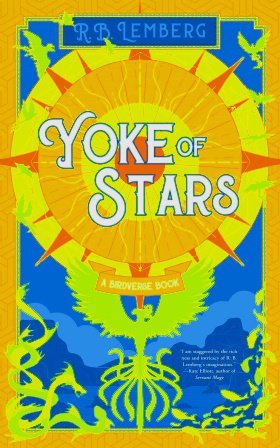I had missed seeing that when I came here, so I would watch when others arrived, for all the ages of Ladder I would not otherwise see. Twenty-five? Sixty-four? This time, the real surprise wasn’t Ladder.
The gates flew open, and a youth appeared.
Unlike the others, he wasn’t on foot. He came floating on a carpet. A dun-brown carpet with a faded pattern of flowers. It felt to me for some reason like the carpet was made of sand. The newcomer was dressed in a long, flowing black dress embroidered with black shining thread, pinwheel patterns. His feet were bare. Above his head, numerous deepnames floated like a diamond crown. I could not count them, so blinding they were.
I had never before seen such a sight.
He jumped down, and the carpet dissolved to dust at his feet. I did not then know his grammar, but he told me later that he used masculine forms. And he wasn’t all that young, either. In his early twenties, perhaps.
Only then did I remember to look at Ladder.
The Headmaster stood younger, thinner, and angrier by far than I had ever seen him; his fists were clenched. I had seen many of Ladder’s ages by now, but never before did I witness him at sixteen. He felt gaunt and murderous. Starving. Unstoppable.
Two other students who came to the gate to witness the newcomer with me now retreated, but I stood my ground. This felt invigorating to me, as if after months of dust I was inhaling a sea storm.
“Who are you?” Ladder asked, more sharply than usual. “Why are you here?”
“I am known as the Raker,” the youth replied. His voice was cold and challenging, rearing up to a fight. “I come because you summoned me.”
“I did not summon you,” hissed Ladder.
The one called the Raker said, “I heard your song. I was having a very pleasant time, but your song disturbed me. I listened to its summons. Now I’m here.”
The youth crossed his arms at his chest, and I watched him stare at Ladder as the Headmaster mimicked the Raker’s pose, cross-armed, both of them breathing with a rage I did not understand.
“And are you bereft of parents?” Ladder asked. “What woe brought you out of your very pleasant time, to my court?”
“My parents are living. Much good does it do me.” The Raker’s expression was inscrutable. “I heard that those who commit crimes inadvertent but terrible are summoned here. I am one of those.”
“And when you were having your very pleasant time, due northwest of here is my guess, with people who hate me and who, without doubt, adore you, why didn’t you just stay there where it’s oh so pretty and pleasant, and where, without doubt, they sang your praises?”
The Raker averted his eyes. Perhaps, for him, that was equal to kneeling.
He was silent for a while. His jaw moved. Then the Raker spoke, in a flat tone. “I harmed my sister. I do not wish that erased. Those who seek to erase my crime, for whatever reason, are not serving me. They are serving themselves.”
Horror reflects in Ulín’s eyes, and her mouth opens, but I shush her. “Do not ask me that question. Please wait. Hear my story like I have heard yours.”
“If you wish to be served,” Ladder said, “you came to the wrong place.”
The Raker shrugged. “Every place is wrong.”
Ladder uncrossed his arms. “Very well. If you want to learn, I will teach you. But this is not Che Mazri. I will not coddle you. In the first circle of training, you must be prepared to kill at my word, or be killed.”
The Raker shrugged again.
I think to get rid of him, the Headmaster gave him hard challenges that very same day. Three students at once, all of them in the first circle, but after months of hard training. The Raker was not prepared to be killed that day, nor was he prepared to tarry. When they attacked him, I saw his rage flare like a blazing explosion in his mind, and he dealt swiftly with his assailants. None were killed that I saw, but neither would they get up.
“What a joke,” spat the Headmaster. “Do you think assassination is about beating people up and throwing them about, or flailing at them with your deepnames?”
“Bird peck you to a thousand bloody pieces,” said the Raker.
The Headmaster raised his right arm to the sky, and his fist clenched open and close, as if to choke someone high up in the air. “What do you think Bird can do to me? She knows where to find me.”
At his command, three more students rushed at the Raker. They were even more experienced, all three armed with dirks and swirling about. This time, the newcomer did not hesitate. It was crudely done, and fast. Three times, the Orphan Star’s embers flared and faded.
I expected praise or at least some acknowledgment from the Headmaster, but he looked as angry as before. “Rage and raw capacity will only carry you so far. You must learn the body.”
“If you think I will sleep with you, think again,” said the Raker.
“I do not invite you to sleep with me, youth. I invite you to study the body.”
“I will not submit,” the Raker snarled. “No matter what you call it.”
Ladder suddenly laughed. “Oh, this is rich. Did my erstwhile lover send you here to try to slay me? Or did you perhaps volunteer?”
“No,” the Raker said, too fast. “I came for the reasons I told you.”

























